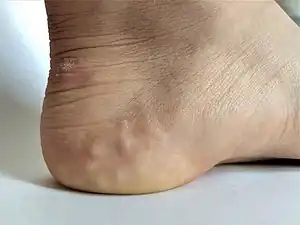Piezogenic papules
| Piezogenic papules | |
|---|---|
| Other names: Painful fat herniation, piezogenic pedal papules[1] | |
 | |
| Piezogenic papules on the heel of an individual with Ehlers–Danlos syndrome. | |
| Specialty | Dermatology |
| Symptoms | Multiple yellowish to skin-coloured small or large bumps, mostly painless; typically on heels and wrist[2][3] |
| Causes | Pressure[2] |
| Risk factors | Obesity, flat feet, athletes, figure skaters, long-distance runners[3] |
| Diagnostic method | Appearance[3] |
| Differential diagnosis | Juvenile aponeurotic fibroma[3] |
| Treatment | None[3] |
| Frequency | Common[1] |
Piezogenic papules are protrusions of fat just beneath skin.[1] They present as multiple small or large bumps characteristically on the heels and wrists.[2] Most are asymptomatic and pain is rare, although some may present with pain before the bumps are noticed.[3] They generally occur bilaterally and display a yellowish to skin-color.[3] They may feel soft or firm.[3][4]
The bumps are caused by pressure.[1] There may be an association with Prader–Willi syndrome, and around a third of individuals with Ehlers–Danlos syndrome may have them.[2] Risk factors include obesity, flat feet, athletics, figure skating, and long-distance running.[3] If present in a child it may appear similar to juvenile aponeurotic fibroma.[3] Generally, no treatment is required.[3] They usually disappear when pressure is relieved; avoidance of prolonged standing, taping foot, compression stockings, heel cups, padding devices.[1]
Piezogenic papules are common.[1] The term was first coined by Shelley and Rawnsley, who first described them in 1968.[5]
Signs and symptoms
Piezogenic papules present as multiple small or large bumps characteristically on the heels and wrists.[2] Most are asymptomatic and pain is rare, although some may present with pain before the bumps are noticed.[3] They generally occur bilaterally and display a yellowish to skin-color.[3] They may feel soft or firm.[3][4]
.jpg.webp) Piezogenic papules
Piezogenic papules.jpg.webp) Piezogenic papules (heel)
Piezogenic papules (heel).jpg.webp) Piezogenic papules (heel)
Piezogenic papules (heel).jpg.webp) Piezogenic papules (heel)
Piezogenic papules (heel).jpg.webp) Piezogenic papules (heel)
Piezogenic papules (heel).png.webp) Piezogenic papules (wrist)
Piezogenic papules (wrist)
Cause and risks
The bumps are caused by pressure.[1] They occur more frequently in runners, athletes, and individuals exposed to long periods of standing.[3] There may be an association with Prader–Willi syndrome, and around a third of individuals with Ehlers–Danlos syndrome may have them.[2]
Risk factors include obesity, flat feet, athletics, figure skating, and long-distance running.[3]
Diagnosis
Diagnosis is by its appearance.[3] If present in a child it may appear similar to juvenile aponeurotic fibroma.[3]
Treatment
Generally, no treatment is required.[3] They typically disappear when pressure is relieved.[1] Management includes avoidance of prolonged standing, and may require using foot tape, compression stockings, heel cups, or padding devices.[1]
Epidemiology
Piezogenic papules are relatively common; in one small population-based study, the prevalence was found to be 76%.[1] The same study found that it was not unusual to demonstrate the bumps when pressing a person's wrist.[1]
History
The term 'piezogenic papule' was first coined by W. B. Shelley and Rawnsley, who first described them in 1968.[5][6]
See also
References
- 1 2 3 4 5 6 7 8 9 10 11 James, William D.; Elston, Dirk; Treat, James R.; Rosenbach, Misha A.; Neuhaus, Isaac (2020). "3. Dermatoses resulting from physical factors". Andrews' Diseases of the Skin: Clinical Dermatology (13th ed.). Edinburgh: Elsevier. p. 40. ISBN 978-0-323-54753-6. Archived from the original on 2023-02-26. Retrieved 2023-02-26.
- 1 2 3 4 5 6 Johnstone, Ronald B. (2017). "35. Tumors of fat". Weedon's Skin Pathology Essentials (2nd ed.). Elsevier. p. 641. ISBN 978-0-7020-6830-0. Archived from the original on 2023-02-26. Retrieved 2023-02-26.
- 1 2 3 4 5 6 7 8 9 10 11 12 13 14 15 16 17 18 19 Brown, Falon; Cook, Christopher (2022). "Piezogenic Pedal Papule". StatPearls. StatPearls Publishing. PMID 29489228. Archived from the original on 2022-01-14. Retrieved 2023-02-26.
- 1 2 "Piezogenic papules images | DermNet". dermnetnz.org. Archived from the original on 2 October 2022. Retrieved 28 February 2023.
- 1 2 Elder, David E.; Elenitsas, Rosalie; Murphy, George F.; Rosenbach, Misha; Rubin, Adam I.; Seykora, John T.; Xu, Xiaowei (2023). Lever's Dermatopathology: Histopathology of the Skin. Lippincott Williams & Wilkins. p. 3254. ISBN 978-1-9751-7449-1. Archived from the original on 2023-02-28. Retrieved 2023-02-28.
- ↑ Shelley, W. B.; Rawnsley, H. M. (29 July 1968). "Painful feet due to herniation of fat". JAMA. 205 (5): 308–309. ISSN 0098-7484. PMID 5694945. Archived from the original on 5 March 2022. Retrieved 28 February 2023.
External links
| External resources |
|---|